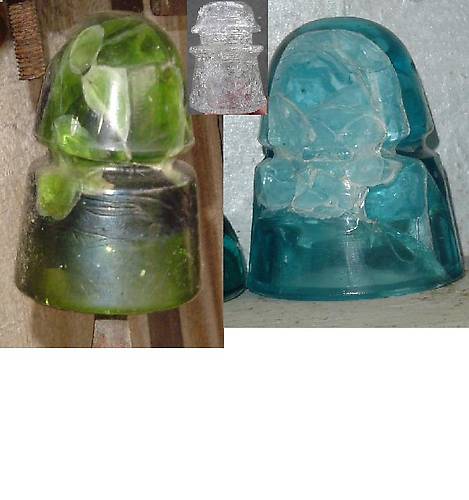Lightning strike crackled glass
By James Mulvey; posted November 11, 2008
View Original: Click to zoom, then click to magnify (735 x 784) 65KB

|
CD 122 shows what happens when an insulator is cracked with hot / cold water. That is not what happened to the two coloured insulators as I picked both off poles in the last couple years. But I am curious as to what caused this effect. Neither one is missing any glass which sort of rules out impact damage. Any thoughts ? Wm Burger wrote " It is my opinion that these two pieces did take a voltage surge which heated the glass very rapidly. I've noticed over my 40 years of collecting that certain insulators seem to be prone to this type of fracturing (flashing). Many of the late (Canadian) Brookfields and many Stars, Knowles and Americans fall victim to this. When finding these insulators in outhouse pits, there is usually little hope of them not flashing up like your pieces as soon as they are exposed to the open air. That's just this reporters opinion. Wm. Burger Brent Burger wrote "I would agree with Widdo Bwudder's comments based on finds I have made and the direct testimony made to me by telephone lineman Bill Reid about racing to finish a double dead-end as a lightning storm appeared off the the SW of Coeur d'Alene. He related that his ground man kept spouting the rules for getting off the lines when lightning was possible, but in a mad dash to finish the job he kept at it and then got off the pole. As it was a tie-off, he had visually inspected each insulator for condition prior to tying each line in. After coming off the pole, he crossed the road to the truck and began to take his hooks off when a loud "boom" sounded at the pole and the entire thing lit up in a flash. Upon climbing the pole the next day to repair damage, many of the insulators looked just like yours. He still had an olive green Star 145 with those deep white fractures on one side. Bill March wrote : By the laws of physics, lightning is a concentrated water burst, but in the form of electric energy. When enough electrical charge accumulates in the atmosphere, a lightning strike occurs, just as a damn will burst when too much water accumulates behind it. So what does water do ? It finds the closest and quickest way to the lowest point, which in the electrical sense, is "ground". Now if you all still follow me, this means the lightning may hit a wire line and arc across the nearest insulator, into the pole, directing it to ground. Once the electrical energy compromises the insulator, travels to the ground, the other insulators on the next pole would be spared, and not receive the same electrical load. In other words, those remaining insulators down the line will probably not see an electrical surge. Of course, I am not "Father Nature", so this may happen most of the times lightning strikes, but not necessarily always. Glass itself is an insulator, I think you'll agree, and hence the conductivity coefficients are such that an insulator would not melt, vaporize, or leap into your collecting sack. However, it is possible for the glass surface to experience an instantaneous thermal shock from the arc of electrical discharge. I don't have firsthand knowledge, but I don't believe a metal wire will melt, unless the insulators block the flow of water, I mean electrical energy, from going to ground. If that's the case, then there is no arcing across the insulator. Thus, when lightning strikes, it's a battle between the wire or the insulator. If the insulator blocks the lightning energy, the wire may fry and melt. If the insulator arcs, the wire will be fine, but the glass may be shocked from the electrical arc. For comparison an example of cracking caused by mother earth and frost [id=231189024] can be seen here |